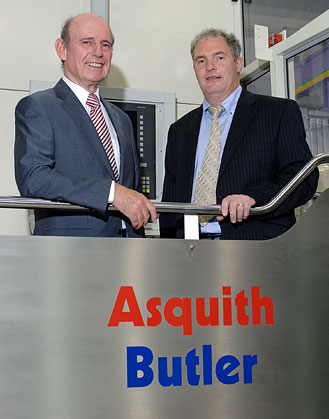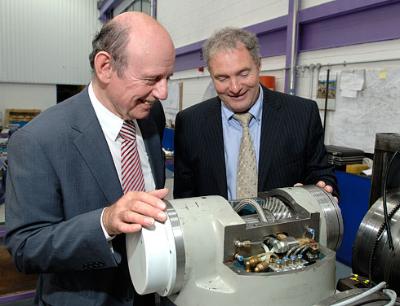Engineering the future
Mon, 13 Aug 2012 10:58:00 BST
Firm with a proud heritage teams up with Uni experts to push the frontiers of technology
Professor Myers [left] with Paul Hinchcliffe [right]

A YORKSHIRE engineering company with a history dating back to the 1860s is forging a bright future in today’s ultra-competitive business world. It is doing so by making machines that offer unparalleled accuracy for manufacturers in advanced sectors such as wind turbines, nuclear power and aero engines. And a research partnership with the University of Huddersfield has played a key role in giving the famous firm Asquith Butler its cutting edge.
The company, now based in new, purpose-built premises at Brookfoot, Brighouse, is the modern incarnation of two engineering firms – Asquith’s and Butler’s – that were founded in mid-nineteenth century Halifax.
Its co-owner and managing director is Paul Hinchliffe, whose engineering career began at the former Asquith’s factory in Halifax. It was there that he first worked alongside Alan Myers, now a University of Huddersfield professor, based in its globally renowned Centre for Precision Technologies.
Now Mr Hinchliffe and Professor Myers have teamed up again, for a project part-funded to the tune of £424,000 by the Technology Strategy Board. The goal was to integrate a machine tool compensation system developed by the University which, when fitted to large milling and boring machines producing complex parts, would result in massive increases in accuracy and do so automatically, without the operator having to intervene. Professor Myers anticipates a five-fold increase in accuracy, leading to much greater manufacturing efficiency.
Asquith Butler’s machines are already inherently highly accurate and are assembled and tested using the latest laser measuring technology, said Mr Hinchliffe. But the new computer-controlled compensation system that is being integrated will check and compensate for errors on an even smaller scale.
The Technology Strategy Board project – which has seen University of Huddersfield post-graduates based at Asquith Butler – is now nearing completion. The system is to be fitted to the firm’s Power Centre 500 machine – it will then be marketed as the Power Turn 500 after further development.
Mr Hinchliffe explained that Asquith Butler’s range of standard machines is manufactured in India. But its specialised, bespoke machines are produced at the Brookfoot factory, where more than £2.5 million has been invested over the past three years, resulting in some of the UK’s best manufacturing facilities. Customers include blue chip companies such as BAE Systems, Babcock and Rolls Royce.
 Among the major new markets for Asquith Butler machines is the nuclear power industry, with its requirement for huge numbers of accurately machined parts.
Among the major new markets for Asquith Butler machines is the nuclear power industry, with its requirement for huge numbers of accurately machined parts.
“We flourish here in the UK because we continually push the forefront of technology for bespoke manufacturing,” said Mr Hinchliffe.
“Working with the University of Huddersfield has been of primary importance because it helps to separates us from firms that just make general machines, as opposed to the very high accuracy machines in our range,” he added.
And this isn’t the company’s only collaboration with the University. They are also one of the key partners in the EPSRC Centre for Innovative Manufacturing in Advanced Metrology which is also being lead by the Centre for Precision Technologies. This is a five-year project to deliver a step-change in technology for on-machine accuracy and measurement.







